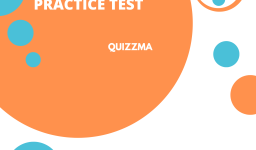Our TEAS 7 Science practice tests cover nursing-related scientific concepts in the exam format.
What is the primary function of the respiratory system?
Which molecule is responsible for carrying genetic instructions?
What occurs during a chemical change but not a physical change?
If you wanted to test how different soil nutrients affect plant growth, what should the control group receive?
Which plane divides the body into anterior and posterior sections?
What is the primary function of the alveoli in the lungs?
Which organelle is responsible for producing ATP, the energy currency of the cell?
According to Mendel's laws, what is the probability of obtaining a dominant phenotype when crossing two heterozygous (Aa) parents for a single trait?
What particles are found in the nucleus of an atom?
In a chemical reaction, what role does a catalyst play?
Which tool is commonly used to measure the volume of a liquid?
What is the first step in the scientific method?
Which cellular structures are responsible for synthesizing proteins from amino acids and are embedded in the rough endoplasmic reticulum (ER)?
Which organelle is involved in synthesizing materials that are transported out of or within the cell?
What organelle consists of sacs used for storage, digestion, and waste removal, with plant cells typically containing one large vacuole?
Which small organelles move materials within a cell?
What structures are rods of DNA that make up chromosomes?
What structures are involved in the exchange of materials between the nucleus and cytoplasm?
Which organelle is involved in the transportation of substances throughout the cell and plays a primary role in the metabolism of carbohydrates, synthesis of lipids, steroids and proteins?
What phase change occurs when a substance transitions from a solid to a liquid state?
What phase change occurs when a liquid transitions to a solid state?
Which gland is often called the "master gland" of the endocrine system because it controls several other hormone-producing glands?
What type of muscle tissue is found in the heart?
Which macromolecule is primarily responsible for storing and transmitting genetic information?
What term describes a solution that cannot dissolve any more solute at a given temperature?
If a plant's leaves turn yellow and drop off prematurely, what might be a possible explanation?
What is the process called when a substance changes from a gas to a solid without becoming a liquid first?
What is the process called when a gas changes into a liquid?
What characteristic is typical of a solution with a pH lower than 7?
Which of the following best describes a solution with a pH greater than 7?
How can you calculate the number of protons in an element?
What is a key feature of the cells produced by meiosis?
What does cytokinesis involve in cell division?
What characterizes a covalent bond?
What is the role of haustral contractions in the digestive system?
What does salivary amylase do in the digestive process?
What is the function of the enzyme pepsin in the digestive system?
What does the Somatic Nervous System (SNS) control?
Which layer of the skin is characterized by flattened keratinocytes and is found in the palms and soles?
What is the primary function of ligaments?
What initiates the conversion of the inactive enzyme pepsinogen into its active form, pepsin?
Which hormone is primarily responsible for regulating blood sugar levels?
What is the basic unit of life, the structural and functional unit of all living organisms?
In which layer of Earth's atmosphere do most weather events occur?
What is the primary function of DNA in living organisms?
Which of the following describes the role of the sodium-potassium pump in neuron activity?
In quantum mechanics, what principle explains the impossibility of simultaneously determining both the position and velocity of an electron with absolute precision?
What phenomenon explains the increase in a fluid's velocity as it flows through a narrower section, resulting in a decrease in pressure and potential energy?
Which of the following best describes a quasar?
Your Result:
Sorry, no results found.
Please repeat the test and try different answer combinations.
ATI TEAS 7 Science Outline
Human Anatomy & Physiology (18 questions)
- Demonstrate knowledge of the general orientation of human anatomy
- Describe the anatomy and physiology of the following systems:
– Respiratory system
– Cardiovascular system
– Digestive system
– Nervous system
– Muscular system
– Male and female reproductive systems
– Integumentary system
– Endocrine system
– Urinary system
– Immune system
– Skeletal system
Biology (9 questions)
- Describe cell structure, function, and organization
- Describe the relationship between genetic material and structure of proteins
- Apply concepts underlying Mendel’s laws of inheritance
- Describe the structure and function of macromolecules in a biological system
- Describe the role of microorganisms in disease
Chemistry (8 questions)
- Recognize the basic atomic structure
- Know the physical properties and changes of matter
- Describe chemical reactions
- Demonstrate how conditions affect chemical reactions
- Understand properties of solutions
- Describe concepts of acids and bases
Scientific Reasoning (9 questions)
- Use basic scientific measurements and tools
- Apply logic and evidence to a scientific explanation
- Predict relationships among events, objects, and processes
- Apply the scientific method to interpret a scientific investigation
Why is a Strong Science Score Crucial for the TEAS 7?
The TEAS 7 Science section assesses your foundational knowledge of the scientific principles that underpin nursing practice. A solid understanding of these concepts allows you to:
- Grasp Human Anatomy & Physiology: Nurses need to comprehend the structure and function of the human body to provide optimal care.
- Apply Scientific Concepts: Understanding biological processes like cellular respiration or the nervous system is essential for effective nursing interventions.
- Interpret Medical Terminology: A strong science foundation equips you to decipher medical terminology used in charts, patient records, and treatment plans.
- Prepare for Advanced Studies: A high score in the TEAS 7 Science section demonstrates your readiness for the science-heavy coursework encountered in nursing programs.
How Will Our TEAS 7 Science Practice Tests Propel You to Success?
- Realistic Simulation: Our practice tests mirror the actual TEAS 7 Science section regarding question types, difficulty level, and subject areas tested.
- Comprehensive Coverage: We cover various science topics relevant to nursing, including biology, chemistry, anatomy, and physiology.
- Detailed Explanations: Gain a deeper understanding beyond just getting the answer right. Our explanations walk you through the scientific reasoning behind each question.
- Confidence Boost: Practice makes perfect! Timed practice tests build your confidence and hone your test-taking skills for the real TEAS 7.
Additional Tips for TEAS 7 Science Success
- Review Core Science Concepts: Focus on refreshing your knowledge of biology, chemistry, anatomy, and physiology, especially areas related to the human body.
- Familiarize Yourself with Medical Terminology: Learn common medical terms and their definitions to interpret scientific information presented in the exam effectively.
- Utilize Diagrams and Visuals: Pay close attention to diagrams and visuals in the practice tests. The TEAS 7 Science section may include questions based on interpreting such visuals.
- Form a Study Group: Discuss concepts and quiz each other to solidify your understanding of scientific principles.
Additional Resources
- Our comprehensive TEAS 7 Study Guide
- All About the ATI TEAS 7 informational page
Let us know if this was helpful. That’s the only way we can improve.



